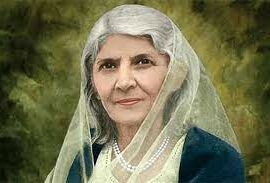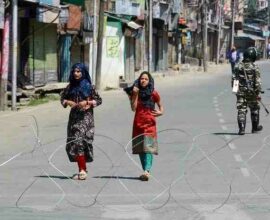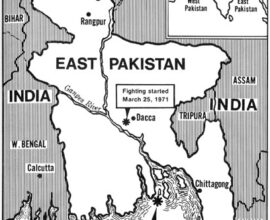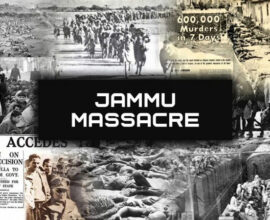Ghulam Muhammad Mir (GM Mir), a noted Kashmiri researcher and intellectual, woefully moans: every day in the calendar is a Martyr’s Day for the people of Kashmir. His mourning succinctly portrays the plight of the people living in perpetual subjugation since 1947. It is an appalling reality that after the creation of Pakistan, leadership of Pakistan and Kashmir, by and large, did not make any sincere effort(s) to engage the international community to get the Kashmir issue resolved. At the domestic level, some efforts were made in 1947 and 1965 to unshackle Kashmir but absence of proper planning, uncanny haste and gross short-sightedness of civ-mil leadership, rendered the endeavours inconsequential. Hence, the people of Kashmir continued to suffer coercion and oppression.
Every year, on 5February, Kashmir Solidarity Day is observed in AJK and Pakistan to express support to the beleaguered Kashmiris. Has a series of such Solidarity Day commemorations stirred the conscience of the international community? Have the agonies of the people of Kashmir been alleviated? Would mere days of commemoration, seminars, fiery speeches and release of fresh songs help liberate Kashmir or provide any respite to their griefs?
This issue calls for introspection to find answers to these blunt questions. It is important to delve into history and recall Shimla Agreement (1972) between India and Pakistan, when Mr Zulfiqar Ali Bhutto altered the status of Cease Fire to the Line of Control (LOC), thereby practically dividing people of Azad Kashmir and the occupied Kashmir. Later, the infamous Four Point Formula advanced by General Musharraf (2006) confused and disheartened the leadership of the occupied Kashmir. His successor, Mr Asif Ali Zardari also proposed to put the Kashmir issue in the backburner for thirty some years and only focus on trade between India and Pakistan. Mr Nawaz Sharief also chose silence on Kashmir issue and preferred trade over Kashmir. It is widely believed that he advised the Kashmiri leadership to seek the solution to the Kashmir issue within the Indian constitution.
Similarly, the clandestine meetings of former spymaster of ISI, General Faiz Hameed, with Indian National Security Advisor, Ajeet Doval in Dubai, to open trade and resume cricketing ties with each other, distressed people in Pakistan and AJK vis a vis the Kashmir issue. In 2021, General Bajwa, the then Chief of Pakistan Army asserted in a press conference in Islamabad to bury past and move forward. His assertion explicated to forget Kashmir for ever. Fortunately, Imran Khan, the then PM, vehemently opposed and thwarted those unholy proposals and schemes. At the UN assembly, he reiterated Pakistan’s unflinching support and resolve for Kashmir.
Today, Pakistan is facing the worst political instability amid serious allegation of massive rigging in 8 February elections, gross human rights violations and open defiance to the constitution and the orders of the Supreme Court of Pakistan. Various national and international organisations, including the UN have voiced serious concerns on these issues. In this milieu, Pakistan’s position regarding Kashmir issue has been severely dented.
Sadly, the political situation in Azad Kashmir has been further tainted by undemocratic influence and political engineering of the ruling families regimented from Raaiwind and Naudero. The way the entire political system in Azad Kashmir and Gilgit Baltistan was wrapped and jeopardised by two families, has further weakened the stance and status of Pakistan on Kashmir issue.
In this connection, the remarks of the PM of Azad Kashmir Mr Chaudhry Anwar ul Haq, brother of a retired general, about the cost of the electricity per unit startled the students of history, politics and law. Speaking on the occasion, on the occasion of the inaugural ceremony of Danish School in Bhimber last month, he remarked that the cost of electricity per unit is the lowest in all provinces of Pakistan. One wonders whether the mention of cost in comparison with other provinces of Pakistan was mere a slip of tongue or there was any method to madness? Has it been decided in powerful corridors to formally merge Kashmir into Pakistan? Wouldn’t it further weaken the issue of Kashmir at global forum?
Today while we are yet again observing the Solidarity Day 5 February 2025, people need to be informed about the ghastly incidents that unfolded in early 1930s. In 1932 in a mosque in Srinagar, on day of Juma -tul -Widah, the Muslims, having offered prayer, protested against the tyrannies of Dogra Raj. It prompted the army to fire, butchering nine and injuring more than forty people. Before that carnage, the killing spree in Srinagar Jail had maimed seventy some and more than one fifty Kashmiri Muslims.
In the aftermath of Jamia Masjid closure, and the desecration of The Quran, wide protests erupted which resulted in more deaths. Those incidents incited Maha Raja to devise heinous plans to quell the protesters. After sacking George Wakefield, Maha Raja appointed Raja Hari Kishan Kaul as the prime minister of the state, who committed to repress the movement within four months.
To bring the situation under control, the government cobbled a Glanci Commission in November 1931. In the meantime, Mr. Jivan laal Minto, one of the agents of the Prime Minister Kaul, sparked a movement in Mirpur and Rajuri, provoking people to non-pay the land tax to the government. In fact, his sinister plan meant to enrage the government, prompting it to launch a severer action.
Feeling visibly agitated, to put down the massive unrest, the Maharaja asked the British Indian government for military aid and action. As a result, for the first time, two Irish Infantry Battalions and one Horse Cavalry Regiment launched an assault on the armless farmers of Mirpur and Rajuri. That outright butchery resulted in murder of around a thousand Muslims in Mirpur and around four hundred in Rajuri. The actual number of injured farmers was never revealed.
After carnage in Mirpur, Sheikh Abdullah, who was in Srinagar jail, telegrammed the government, completely dissociating himself with the movement in Mirpur and Rajuri and the subsequent murders of Muslims there. Following that announcement, Sheikh Abdullah was released from jail, compounding miseries of the Muslims. Are young generations in Kashmir, Pakistan and abroad aware of such harsh historical realities? Has the Kashmir issue not been practically forsaken by our policies and plans? Would these solidarity day speeches, seminars or statements, billboards not elicit any scorn from the international community that is keenly following the realities unfolding in Pakistan and Azad Kashmir? Hasn’t Kashmir Solidarity Day lost appeal to tech-savvy, well-aware and fearless generation of the Indian occupied Kashmir?





